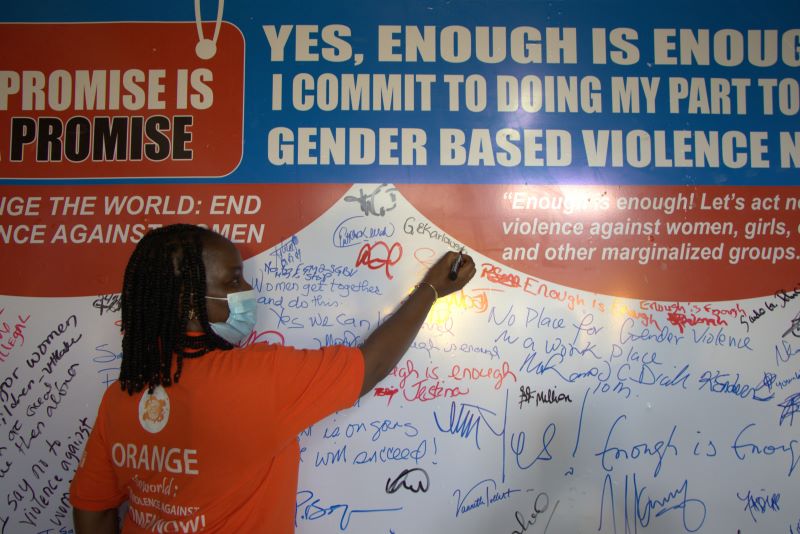
Ending Violence Against Women and Girls

Violence against women and girls (VAWG) is one of the most widespread, persistent and devastating human rights violations. It is a major obstacle to the fulfilment of women’s and girls’ human rights and to the achievement of the 2030 Agenda for Sustainable Development – which aims to leave no one behind. Ending violence against women and girls (EVAWG) is considered one of the most important and urgent priorities for UN Women in Liberia, where patriarchal social norms are deeply rooted and VAWG is widely accepted.
UN Women’s Ending Violence Against Women and Girls (EVAW) pillar builds on previous and existing work on violence against women and girls including the first, second and third generations of the SGBV Joint Programmes based on five strategy pillars including Prevention, Response, Institutional strengthening and Advocacy, communication and Social Mobilisation and Coordination. These Pillars inform the Spotlight Initiative, which is a joint initiative of the United Nations System and the European Union in partnership with the Government and Civil Society of Liberia, which seek to contribute to the elimination of sexual and gender- based violence, harmful practices and obstacles to access to sexual and reproductive health rights. In Liberia, the Spotlight Initiative was launched in 2019.
UN Women Activities
UN Women is delivering on activities in three out of the six pillars, which include the following; Pillar 2 – Institutional Strengthening, Pillar 3 – Prevention and Social Norms and Pillar 6 – Civil society organisations (CSOs) and Women Movement. The program seeks to deliver on a) the institutionalization of Gender Responsive Planning and Budgeting Principles (GRPB) in 6 government line ministries, b) build the capacity of CSOs and women rights groups to conduct evidence based monitoring, advocacy and awareness campaigns, c) engage traditional, religious, community leaders and members in addressing negative social norms attitudes and behavior and the elimination of the practice of Female Genital Mutilation (FGM), d) build the capacity of media practitioners and media institutions in gender sensitive and ethical reporting, e) build the capacity of CSOs and Women Rights Groups such that they are integrated in coalitions and networks and can better advocate for ending all forms of violence against women and girls and f) provide grants to CSOs and Women Rights groups to conduct awareness activities and support survivors of violence in hard to reach communities so as to provide them access to services including legal aid.
Some Achievements of Phase One
• With the institutionalization of Gender Responsive Planning and Budgeting (GRPB) Principles in the draft final year 2022 National Budget, the Government of Liberia has allotted USD$380,000.00 in the draft FY 2022 National Budget to support the institutionalization of gender responsive budgeting in nine (9) line Ministries;
• 300 former traditional practitioners were involved in climate smart agriculture program, Village Savings Loans and businesses. To date, 12 Village and Savings Loan Association (VSLAs) grew their capital from LD$2,149,775.00 in 2020 to LD$5,173,820.00 in 2022. This has resulted in an increase in household incomes for traditional practitioners and sustain their businesses, most of which have grown from small businesses to middle-level businesses.
• 23,425 community dwellers from 212 communities (8,480 women, 5,382 men, 4,966 girls and 4,597 boys), including traditional, religious and community leaders, have increased knowledge on SGBV and COVID-19 preventive measures as well as information on the referral pathway
• 388 media practitioners (91 females and 197 males) from 66 media institutions including 44 radio stations, 13 newspapers, 3 television stations and 6 online/social media outlets were trained to have increased knowledge and skills in advocacy, media engagement and Gender Sensitive Reporting of SGBV cases and ensuring that survivors/victims are not re-victimized or stigmatized.
• The development of the Comprehensive Prevention Strategy Document, the first of its kind in Africa which took into consideration potential and actual perpetrators and laid the road map to address the underlying root causes, gender inequality discriminatory norms and values, based on a thorough analysis of risk factors for the forms of violence that it seeks to address including promoting change in social norms, attitudes and behaviors at all levels;
• Establishment of 5 CSO Secretariats that coordinates the activities of CSOs including those representing vulnerable and marginalized groups that addresses SGBV, HPs and promotion of SRHRs;
Information on Phase 2
The program seeks to build on lessons learned during the implementation of Phase 1 activities, which include extension of the alternative economic livelihood opportunities for traditional practitioners in 6 non-spotlight counties in Liberia, monitoring of the enforcement of the policy statement on the suspension of Female Genital Mutilation (FGM) throughout Liberia, strengthening engagement with male network and groups as well as marginalized and vulnerable groups and strengthening the capacities of media practitioners and institutions as well as civil society organisation in advocating for the rights of women and girls